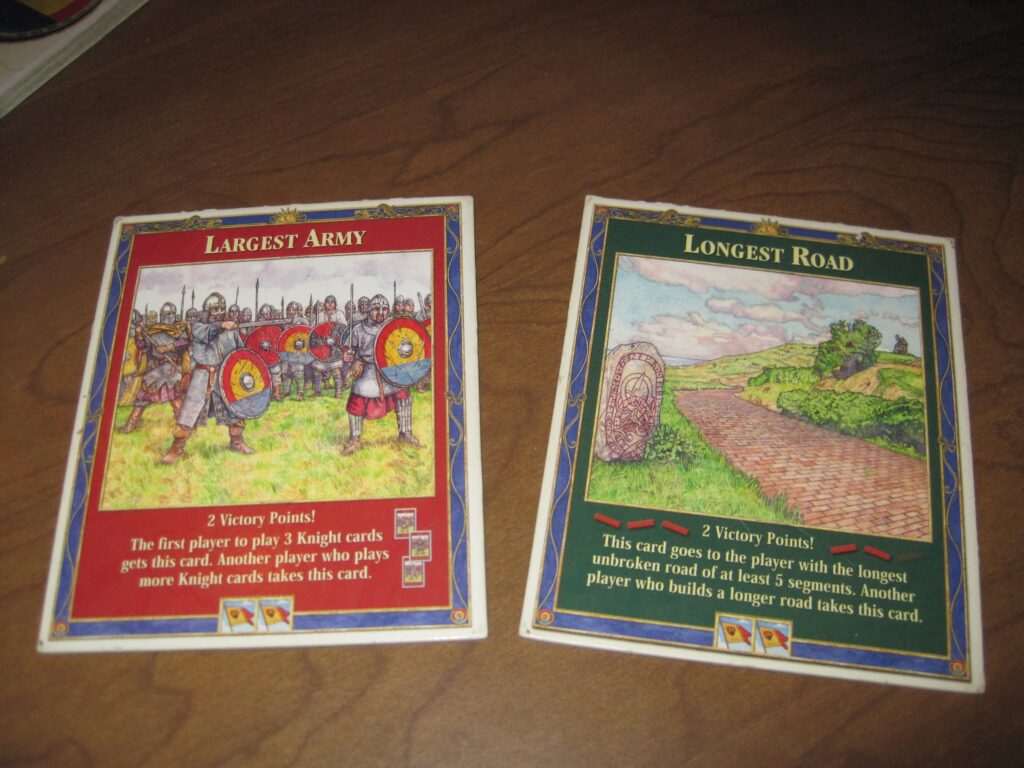- Home
- Blog
- Pay-Per-Click Does Your Pay-Per-Click Manager Play ‘The Settlers of Catan’?
Does Your Pay-Per-Click Manager Play ‘The Settlers of Catan’?
Have you ever played ‘The Settlers of Catan’? If you haven’t, you should. Though, it’s extremely addictive … don’t say you haven’t been warned.
Anyway, my friends and I play it a lot more than I’m proud to admit; in fact, it is well known in my group of friends that I love two things in this life: my job and the game ‘The Settlers of Catan’, more affectionately referred to as simply ‘Settlers’. ***Before I go on further, I want to provide a disclaimer that reads: I’m in no way comparing spending real money on advertising to a game – nor should you treat running such a campaign as such; I simply appreciate greatly the use of strategy and logic in each.*** I love my job more than my friends can appreciate — but I had a revelation the other day as we were playing (which is not a rare occurrence). That they would love my job too. Because I get to play Settlers all day, every day (not literally – but wouldn’t that be cool?).
I say this because I recognized a correlation between the game and managing a pay-per-click (PPC) campaign. For those of you who have never played Settlers, I’ll try to make some sense of it for you. Settlers is an extremely complicated game (which is probably why I love it so much) and tends to intimidate first-timers.
It requires logic and strategy, two things I love to exercise. So this got me thinking — what else requires logic and strategy? Managing pay per click campaigns.
Aha! That’s why I love Settlers so much — or perhaps why I love managing PPC campaigns so much. Either way, it’s no secret, I love both. I love to look at the resources presented and try to make the most efficient use of what is available to me – forcing me to be both tactful and shrewd.
If you’ve ever run a PPC campaign, you know at least the basics of how it works… You bid on this keyword and that keyword … you tweak ad text according to which ads perform best and you make sure your landing page is tailored to the traffic you are sending there. But, ultimately, at the forefront of your mind, you’re asking yourself ‘how little can I pay and still maintain the #1 (or perhaps another that works better for you) position for my best-performing keywords?’
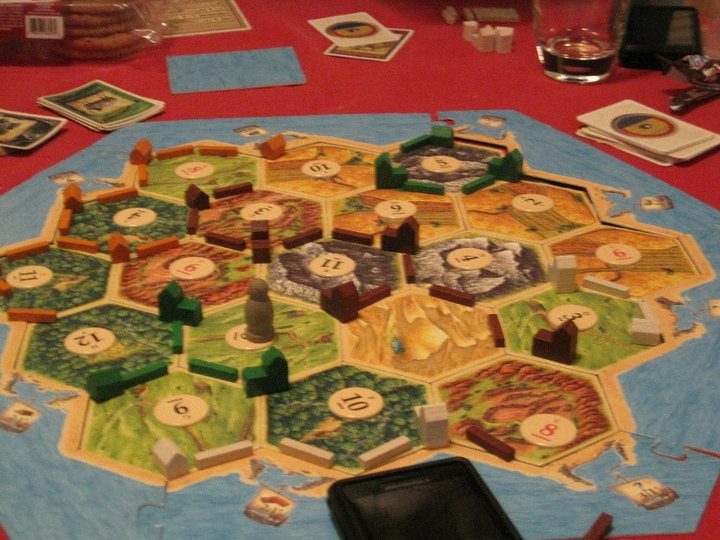
Longest road = 2 victory points; 4 cities at 2 victory points each = 8 victory points; and a settlement at 1 victory point = 11 victory points (you only need 10 to win). I strive to always exceed what is required.
So just how does this compare to managing a pay-per-click campaign? Let’s break it down shall we…
- It’s strategic and forces you to think logically … just like managing a PPC campaign.
- It can be intimidating to those who have never played before, just as AdWords can be intimidating to those who have never used it.
- It’s complex, and there are a lot of things to keep in mind and remember – AdWords anyone?
- It’s about making informed decisions and thus making the most cost-effective use of the resources available to you … do you see a pattern?
Treading softly and thinking wisely … that’s the name of both games. The Play In Settlers, there are several ways to acquire the resources you need to build what it is you need to build to ultimately reach 10 victory points (the objective) before any of your opponents.
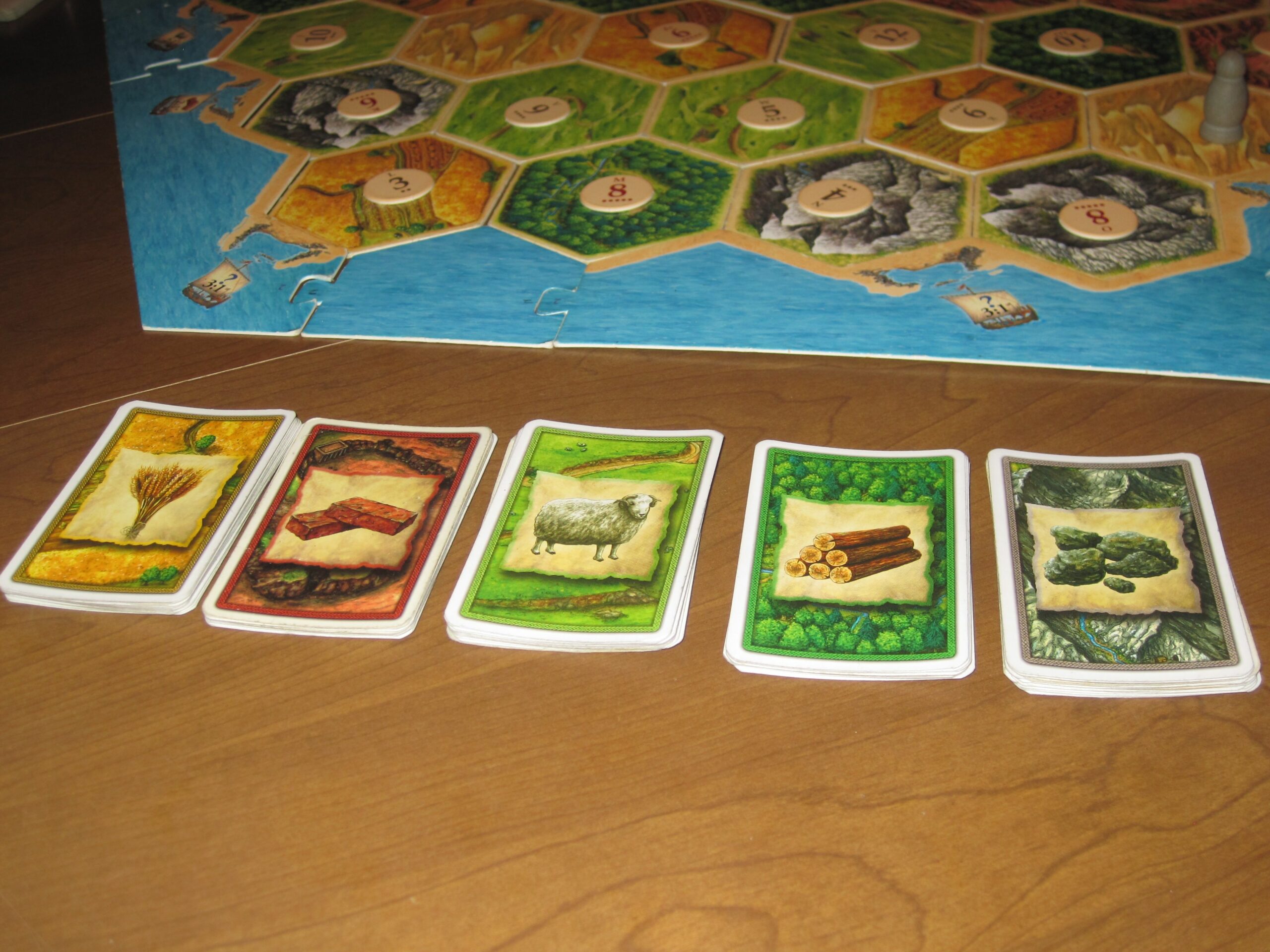
Resource Cards The resources are of the utmost importance – because just as dollars buy you ad rank, resources buy you properties, and thus victory points. You do not have to (nor should you) show anyone the cards you have until you’re ready to play them so you can keep your strategy a secret – much like in AdWords where you don’t want your competitors to know which keywords work best for you.
Though, all the while you want to be paying acute attention to what resources others pick up (and likewise do your research on what keywords your competitors are bidding on) so you can constantly stay ahead.
Making a Purchase In Settlers, you can build a road (1 brick and 1 wood); you can build a settlement (1 brick, 1 wood, 1 sheep and 1 wheat); you can build a city (2 wheat and 3 ore); or you can purchase a development card (1 ore, 1 wheat and 1 sheep) while in AdWords you likewise have several options based on what you’re looking to achieve – you can bid on an exact match, a phrase match or if you’re feeling daring, a broad match keyword.
Rolling the Dice The way this game works is the dice determine all. If your numbers are rolled, you get to pick up your resources. If they don’t get rolled, well the game can be daunting and go on what seems like forever.
Kind of like if your keywords are queried in search, your ads appear and everyone is happy, and if your ads aren’t appearing at the price you’re willing to pay – you’re hoping eventually they will (of course with PPC this takes some work on your part to up that quality score, whereas with Settlers you’re forced to simply wait it out). And thus comes the AdWords auction – not so affectionately referred to as the bidding war – and, based on your bid, you’re hopeful your ad gets shown – similar to how you’re hopeful your numbers are rolled in Settlers.
Trading If you are in need of a particular resource, you can trade for it – that is, if you have something your opponent wants and is willing to trade for. Your opponent knows the value of his or her resources; if they have a resource they know is scarce, they expect you to pay kindly for it – 2, 3, perhaps even (gasp!) 4 cards for that one card you so desperately need.
Just as Google and MSN (Bing) know the value of your keywords – they expect you to pay kindly for them. While you’re thinking ‘how little can I pay for the best position?’, Google and MSN are thinking ‘how much are companies willing to pay for the #1 position?’ – and you mutually (or maybe not so mutually) agree upon that figure. When it comes to both trading in Settlers and determining your maximum CPC (cost-per-click) in AdWords or adCenter, you have to always be considering what the most cost-effective use of your resources are.
For instance, in Settlers, say I have 5 brick, a wood and a sheep and I want to build a settlement (which, again, costs 1 brick, 1 wood, 1 sheep and 1 wheat), and still need a wheat in order to do so; and sadly, no one is willing to trade their wheat due to its scarcity. Fortunately I have 4 additional brick to the one I actually need at this moment. (The general trade-in with ‘the bank’ is 4 of any one resource for any 1 resource I want.) This is a costly endeavor.
However, if I don’t do it and decide to wait it out to see if I pick up a wheat the next go-round, I risk losing cards. This is because I am leaving myself with 7 cards in my hand, and should I go over before my next turn and a 7 is rolled, I’m in trouble – if a 7 is rolled and I have more than 7 cards in my hand, I have to get rid of half of my cards (tragedy that would be!). So I have several options; I can either a) risk going over 7 cards, b) buy a road (which I don’t really need at this moment) with one brick and one wood so I have a few less cards and hope I likewise pick up another wood to use for my settlement on my next turn, or I can c) take advantage of the plethora of brick in my hand to buy a very expensive wheat so I can ultimately buy a settlement on this turn.
So I know the resources and options available to me and what I can get for said resources. Now I just have to decide what the most cost-effective option is for me (as you of course would with a PPC campaign); I can hold out and risk losing cards (kind of like missing out on clicks while you hold out for a lower-cost auction) or I can buy what I want for a little bit more than I’m normally willing to pay.
The Elements Development Cards
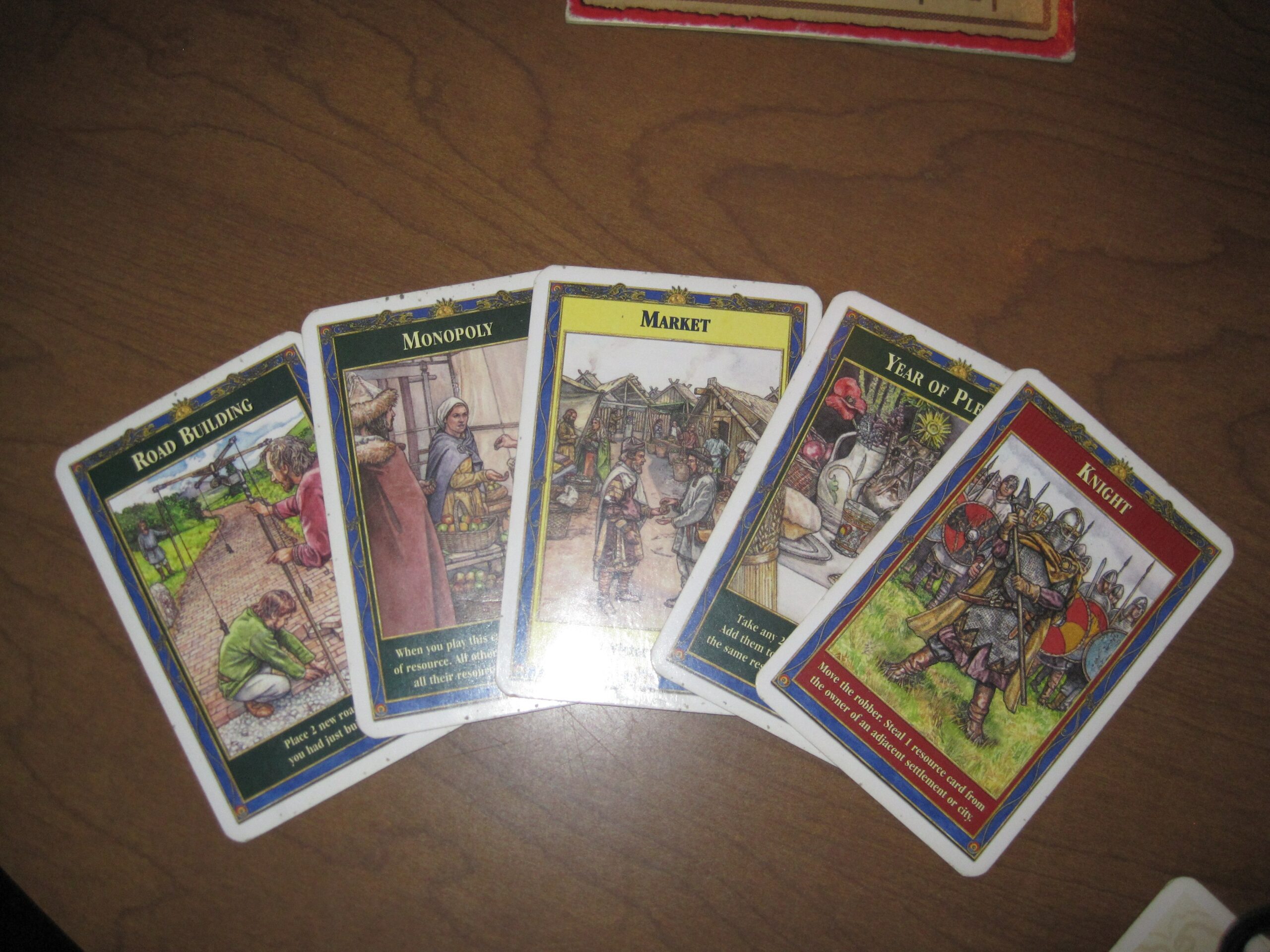
As aforementioned, there is an option to purchase what are referred to as “development cards” (each explained and compared below). Just as you keep your resource cards a secret, you do not want to let anyone know what development cards you have until you’re ready to play them, keeping your strategy a secret (again, ideally, your competition has no idea what is working for you).
Monopoly First we have the ‘Monopoly’ card.
With this card you get to monopolize one resource of your choice. In other words, take any instance of this resource that your opponents currently possess from them (fun, right?). There is one catch however, you must choose wisely – otherwise you could end up realizing that no one actually has that resource and you just wasted a perfectly good ‘Monopoly’ card.
This card of course gives you a competitive edge – as does cannibalizing the results for specific search queries. Consider the following though. Perhaps you start bidding on a keyword that is relatively inexpensive because your competitors aren’t willing to pay as much as you are – you think you hit the AdWords jackpot – finally, you have the opportunity to take traffic away from your competitors because you can pay a bit more than they’re willing to!
But what good would it be if the seemingly ‘competitive edge’ you were so excited about is ultimately not an edge at all because no one ever searches for that keyword?
The Knight When you play this card, you get to move the “Robber” and place it on someone else’s (or several others’ resource, so they are not able to pick that resource up). You then get to steal a resource from someone. (This is always fun when you’re the one moving the robber, not so fun if you’re on the wrong end of it).
You want to ensure you take full advantage of this opportunity and choose wisely – making sure you know what your competitors have in their hand and how useful it will be for you, and choose who to steal from accordingly. This is much like choosing the appropriate competitors to perform a competitor analysis on – it should never be in vain.
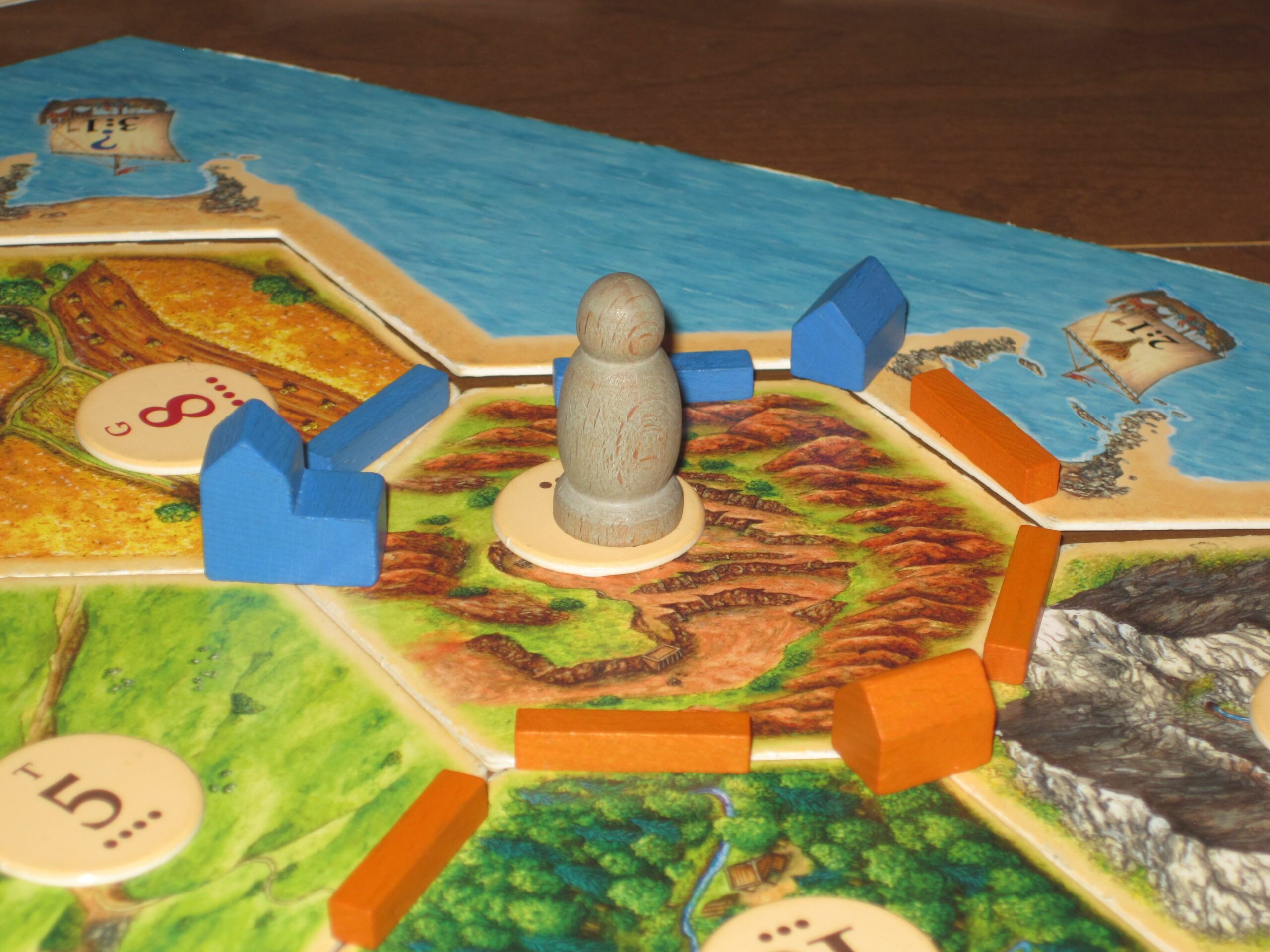
Victory Points These are my personal favorite: free victory points that no one knows you have (unless they’re paying attention really well and can speculate that perhaps you do in fact have one or two). This is all about making sure you’re on top of everything and keeping track of what your competitors are doing – as you should be doing with any PPC campaign.
What areas are they winning in and why? How can you match if not beat them in this area?
Road Builder In other words, traipsing in new, uncharted territory. The reason this card is beneficial is because you get to build 2 roads, of which you need in order to build a settlement – however, you have to be certain it is not only feasible to build where you are trying to go, but you should be confident that you will beat other contenders for that spot.
This compares to PPC because you need to do your research and make sure you have the ability to outrank your competitors based on your ads and landing pages – otherwise you suffer a low quality score. It’s not worth going after traffic simply to “beat out the competition” if it’s not worth it to you in terms of profit.
Year of Plenty This card allows you to take two resources of your choice from ‘the bank’ to use at any one time – perhaps resources you don’t have adequate access to on the typical dice roll. I equate this to the “See Search Terms” function in the AdWords platform – this is one of my favorite tools to use when I’m working on improving any PPC campaign.
When I’m not using exact match keywords I can never be 100% certain what the actual search queries were that elicited my ads – unless I reference this invaluable tool to provide me with something I wouldn’t normally have access to. What keywords brought in traffic that I have not before considered? Was it quality traffic?
Should I consider adding those keywords? Should I consider adding them as negative keywords? This tool helps me determine the best way to discover not only new traffic opportunities, but likewise the best way to make sure I’m reaching the right kind of traffic.
Your strategy of purchasing development cards can also help you acquire the ‘largest army’ (3 knights cards) which equates to two victory points. Similar to the ‘largest army’ is the ‘longest road’ (also worth two victory points) – if you have at least 5 roads consecutively built and you have, ironically, the ‘longest road’ compared to anyone else. These two opportunities for bonus points are of course accrued over time with a little effort on your part – much like a successful quality score – providing you a competitive edge.
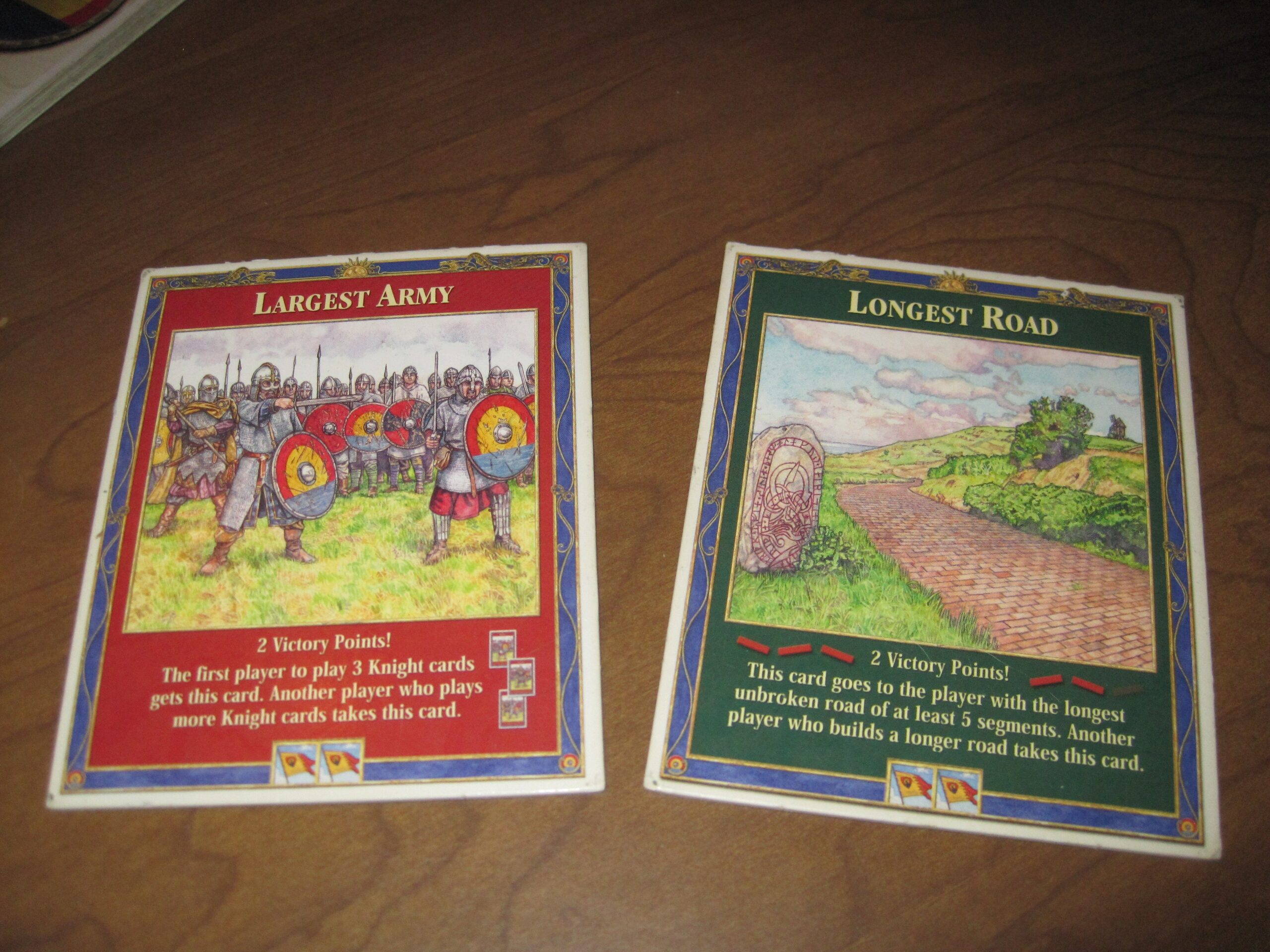
What if I have a Significantly Lower Budget than my Competitors? It’s sensible that the more you’re willing and have to spend (resources) the more you can expand.
And of course the more you’ve expanded, the more of the game board you cover, and thus the more you saturate the game board (and the SERPs). In sum, unfortunately it seems the big guys always win; the ones who have all the right numbers (and have more marketing dollars to spend). Though, sometimes the little guys end up pulling out from behind with a sneak attack because they endured along the way … and we all love an underdog victory.
This is because if you work really hard to optimize your landing pages and your ads to ultimately increase your quality score, you may just come out on top at a price you’re willing to pay and can afford. So even if you think you couldn’t possibly compete in the search engine marketing world, don’t count it out too quickly – you may end up being pleasantly surprised.
Ultimately, the reason I find Settlers to be so similar to running a pay-per-click campaign is because the entire journey is about figuring out what works and what doesn’t work and honing your strategy along the way – because what works for one company, may not work for you. If you continue to build upon what you have learned, your strategy can only improve moving forward.
You would never want to take two steps back in a game, nor would you want to in online advertising.
So when you’re looking for pay-per-click managers, you may want to ask if they play this game – because I’d venture to say if they do, it means they love thinking strategically (a requirement for any PPC manager). The fact that they play Settlers on a regular basis is not a requirement however, just a bonus :).
I’ll ask one more time: does your pay-per-click manager play Settlers? Or perhaps the more important question to be asked is, are they good at it?
-

WebFX is a full-service marketing agency with 1,100+ client reviews and a 4.9-star rating on Clutch! Find out how our expert team and revenue-accelerating tech can drive results for you! Learn more
Try our free Marketing Calculator
Craft a tailored online marketing strategy! Utilize our free Internet marketing calculator for a custom plan based on your location, reach, timeframe, and budget.
Plan Your Marketing Budget

Looking for More?
Get expert ideas, industry updates, case studies, and more straight to your inbox to help you level up and get ahead.
"*" indicates required fields
Try our free Marketing Calculator
Craft a tailored online marketing strategy! Utilize our free Internet marketing calculator for a custom plan based on your location, reach, timeframe, and budget.
Plan Your Marketing Budget

